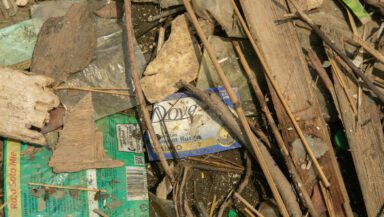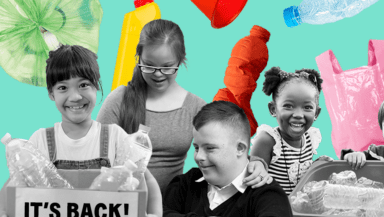A report released by Greenpeace Mediterranean today, Game of Waste, reveals that five sites in southern Turkey are extensively contaminated with hazardous chemical pollutants. Last year Greenpeace investigators found UK grocery packaging dumped in the same five areas. Scientists found that levels of toxic chemicals in the soil and ash at some of these locations are thousands of times higher than control sites.
Samples of soil, ash, water and sediment collected from the five plastic waste dumpsites were examined by scientists from both Greenpeace Research Laboratories and an independent laboratory. They tested to identify as many chemical pollutants as possible, and also measured the concentrations of more than 60 chemical pollutants generally associated with plastic packaging or the burning of plastics. The presence of a wide range of toxic chemicals was identified in ash and soil samples from all five locations.
Dr Kevin Brigden, one of the scientists who carried out the analysis, said:
“Many of the chemical pollutants found in the samples of ash and underlying soil are highly resistant to breaking down in the environment and can build up in animals and humans over time. Levels of these pollutants were very high at some of these sites.”
Dioxins and furans: The scientists found that the level of dioxins and furans detected at one site was the highest ever reported in the soil in Turkey – 400,000 times that of the control site. In another location the level of dioxins and furans in ash was more than 6,000 times that of soil at the control site. Dioxins and furans can be toxic to fetuses, cause premature birth, trigger tumours, cause skin lesions and affect hormone and immune systems.
Polychlorinated biphenyls (PCBs): At one location the total concentration of polychlorinated biphenyls (PCBs) in soil was found to be 30,000 times higher than the control sample. Exposure to PCBs can harm embryos and fetuses and disrupt hormones, and PCBs can be transferred from mothers to babies via breastfeeding.
Metals and metalloids: Certain metals and metalloids were found at elevated concentrations across all sites including cadmium and lead which persist in the environment and can accumulate in the body. Lead can cause irreversible damage to the nervous system and cadmium is classified as carcinogenic for humans.
Polycyclic aromatic hydrocarbons (PAHs): In four locations chlorinated benzene compounds were found, some of which can affect the blood and cause skin lesions and liver disease. In some places the concentration of benzo(a)pyrene, a known human carcinogen, in ash samples was above the limit allowed for residential soils in Turkey.
Similar contamination was commonly found both in ash from the sites and in the soil under the ash, indicating that these highly toxic chemical pollutants were transferred from ash to the soil. Some of the organic pollutants that the scientists found in high levels can remain in soil for a very long time. These chemicals can potentially contaminate nearby surface water and leak into underground water sources. This pollution can harm wildlife, microorganisms, plant life and people. The chemicals can biologically accumulate once they enter the food chain.
Megan Randles, Political Campaigner at Greenpeace UK, said:
“This is the toxic fingerprint of Britain’s dangerous pattern of dumping plastic waste out of sight and out of mind. This proof of the harm our plastic can cause, when dumped and burned overseas, should spur the government on to do the right thing and ban plastic waste exports.”
Nihan Temiz Ataş, Biodiversity Project Lead at Greenpeace Mediterranean, said:
“Turkey’s soil, air, and water are bearing witness to the environmental and human health costs of Europe’s plastic waste exports. Countries like the UK and Germany, who ship their plastic rubbish overseas where it’s dumped and burned, are leaving a toxic trace in Turkey’s fertile soil. This damage is irreversible. Exporting countries must take responsibility and stop sending plastic to Turkey. Turkey is not your plastic dump and these harmful waste games must end.”
From January to November 2021 the UK exported 117,678 tonnes of waste plastic to Turkey (December data not yet available). The volume of mixed plastic waste exported from the UK to Turkey fell following the May 2021 Greenpeace investigation into UK plastic being dumped and burned, and the government of Turkey restricting imports of waste with more than 1% contamination. However there has been a month on month rise since July 2021. The November 2021 export total (4,126 tonnes) was almost ten times the July total (484 tonnes).
ENDS
Contact: Alex Sedgwick, press officer, alexandra.sedgwick@greenpeace.org, 07773 043 386.
Notes for Editors:
The new report Game of Waste is here.
The full analytical report from the Greenpeace Research Laboratories is here.
A collection of photographs of the scientific testing is here.
Why we tested for these particular chemicals: The scientists carried out forensic analysis to identify as many chemical pollutants as possible. They then chose to analyse the concentrations of 16 different polycyclic aromatic hydrocarbons (PAHs); 18 different polychlorinated biphenyls (PCBs); 17 different polychlorinated dibenzo-dioxins/furans (PCDD/F) commonly known as dioxins/furans and 18 different heavy metals and metalloids. The chemical analyses of samples from the five chosen sites were compared with samples collected from nearby control locations, where plastic had not been dumped.
Turkey has seen a huge rise in plastic waste coming from the UK and elsewhere in Europe ever since China’s ban on exported plastic waste in 2017. Exports of plastic waste from the UK to Turkey increased by a factor of 18 between 2016 and 2020, from 12,000 tonnes to 210,000 tonnes. In August 2020, INTERPOL noted that this had contributed to an explosion of waste crime, with imported plastic waste dumped illegally and then burned.
Greenpeace UK is calling on the government to enact the Environment Bill, and use the powers within it to ban all plastic waste exports, not just to non-OECD members as promised in their manifesto pledge. This should start with an immediate ban on all exports to non-OECD countries and mixed plastic waste to OECD countries. Greenpeace UK is also calling for a complete ban on all plastic waste exports by 2025, and for the government to also set legally-binding targets to reduce single-use plastics by 50% by 2025.
Update, 3/3/2022: For clarity this page has been updated. Chemical contamination was found at the same five locations in Turkey where UK plastic packaging was previously found but this study did not seek to prove a link.



